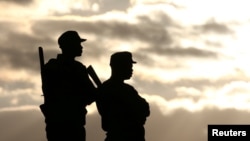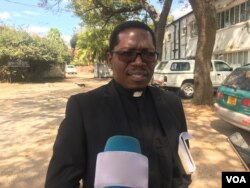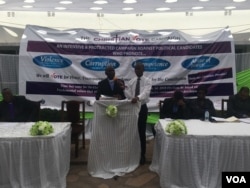Churches in Zimbabwe have launched a campaign to promote tolerance and peace as the country prepares for next year’s elections. A pro-democracy coalition of NGOs in Zimbabwe says it is worried by tensions building in the southern African nation.
In an interview after the launch of a 12-month program to promote peaceful elections, Reverend Kenneth Mtata, the secretary-general of Zimbabwe Council of Churches said his organization notes Christians make up the majority of the country’s population.
He was polite in responding to critics in the pro-government media who say the church is meddling in politics.
“Yes that is true we have no business in party politics. But every Zimbabwean has responsibility over what happens to them," he said. "If you define politics as a way of distribution of power, of resources, then it is a concern for everyone. The only reason why we enter into this discussion because our nation has not healed. There are many problems in our nation and if we do not address these problems, people come to church every Sunday, we are hosting 80 percent of the population, if we renege on this responsibility I think we would have failed the citizens of Zimbabwe."
He says the churches are saying no to violence and violent candidates, no to corrupt candidates, no to incompetent candidates, and no to abuse of Zimbabwe’s constitution.
Director Jestina Mukoko of the Zimbabwe Peace Project, a coalition of pro-democracy NGOs, says that is not all.
"The media is awash with hate language. What that does at a local level, it translates to physical violence," she said. "For me, what I would want leaders to be speaking about and also the media, is basically against political violence. And reduce this hate language rhetoric that is all over the media because it does not do us any good. We are months from the elections, but at the rate we are going, it is a bit concerning."
In 2008, the African Union nullified results of an election in which President Robert Mugabe had declared himself winner. That was after the main opposition leader Morgan Tsvangirai had withdrawn from the contest citing deaths of his supporters at the hands of suspected members of the ruling Zanu-PF.






